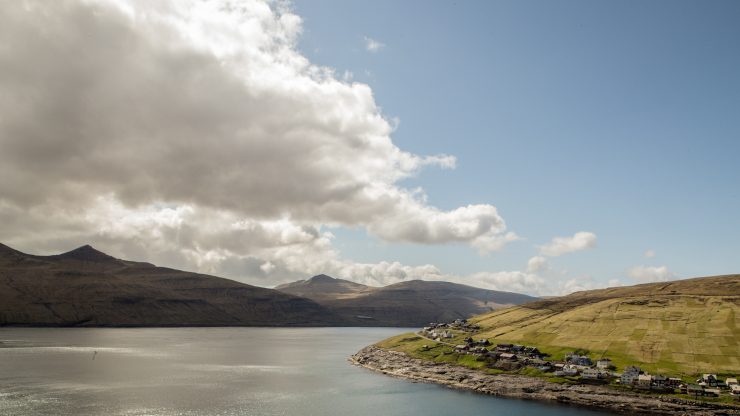
61.8926° N, 6.9118° W. The far reaches of the North Atlantic. Situated between Iceland and Norway, near the northern Scottish isles, is a set of islands steeped in beauty, ruggedness, a fearless nature, and tradition. With a population of just 50,000 and their geographic isolation, trends in the Faroe Islands tend to follow mainland Europe in a predictably slow fashion. Coffee is no exception.
Life in the Faroe Islands truly isn’t much different than life elsewhere, only in terms of scale. There are movie theaters, albeit a bit smaller. There are bars, though scattered only in a handful of towns. And there is coffee: black, bitter, and consumed for caffeine without pomp or circumstance. Recently, an advertising blitz has made small waves amongst the locals, pushing vending machine coffees and Nespresso. But brewing underneath all of that, ten years of passion and word of mouth have finally culminated in the first modern coffeehouse that the islands have ever seen: Brell Café.
Faroe is a near-autonomous country under Danish rule, and outside of the more political arenas, it feels as such. However, it is not uncommon for Faroese people to leave the region for a time, often to Copenhagen. While not everyone does go abroad, doing so (at least to an outsider) appears to be a rite of passage for the younger generations. Often they return when they’re older, bringing back the aspects of fashion, food, and culture that fit within the progression of Faroese life. Róaldur Jákupsson, Owner and Roaster at Brell Coffee and owner of Brell Café, was one such person.
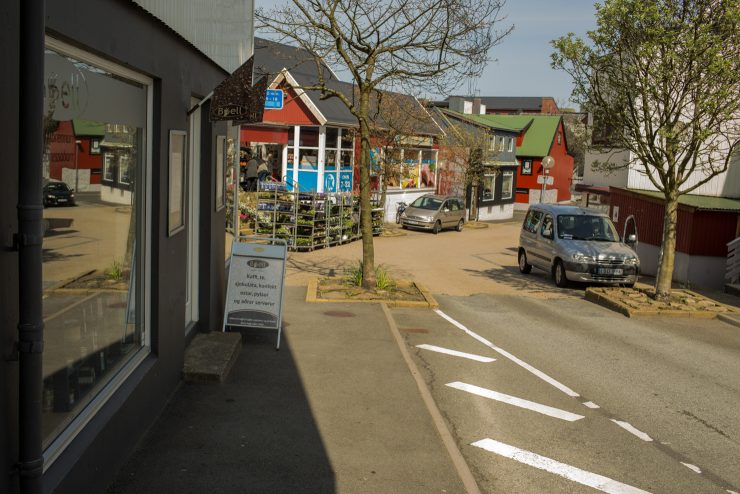
There are plenty of cafes scattered across the country, but most are food-centric, even those serving espresso-based drinks. My wife and I stumbled upon Brell purely by accident. We were at Guðrun & Guðrun, a shop famous for traditional Faroese knit sweaters and patterns. While checking out I asked the woman at the counter for a coffee recommendation nearby; her answer was immediate, “The shop next door.” As it happens, this is precisely how Jákupsson has generated business since he began roasting, proclaiming, “I used to [do advertising] in the beginning, but found it useless. Now I only rely on word of mouth.”
Jákupsson left the Faroe Islands when he was younger, living on the West Coast of the US and in Copenhagen during and after university—the city where his love of high-quality, well-roasted beans began. Though globalization is swiftly closing the gap, trends in the islands tend to follow the Danish mainland by five to 15 years. Róaldur knew he could be on the forefront of the Faroe Islands coffee scene, well-established by the time the trend reached the islands. Starting up shop in a summer home, he began to roast.
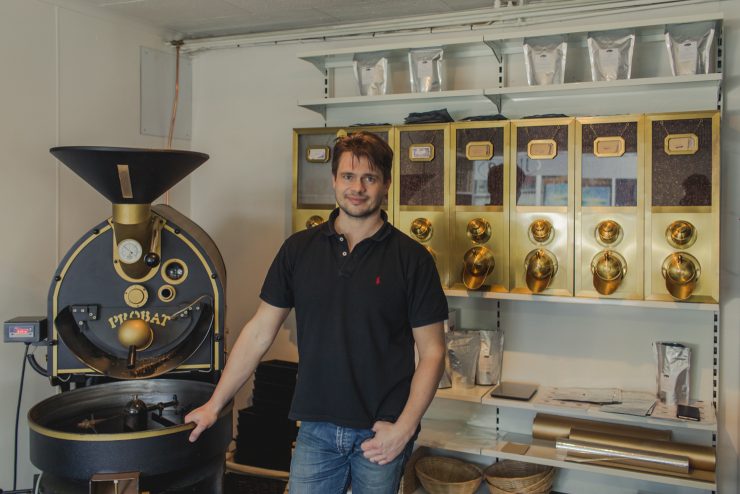
The roaster is now located in a single-room storefront on a pedestrian-friendly street within the downtown area of Tørshavn, the Islands’ capital. It’s the fourth move for Brell, following time in an old factory space and a less ideal shop down the block. It’s a small space, housing only a small storage area for green coffee, merchandise-adorned shelves and windows, and the 12-kilogram Probat roaster. A wall of the current roasts sits in the back, each enclosed in a glass display, each origin showcased.
Jákupsson sources coffee from green importer Nordic Approach, his goals familiar to those in Third Wave culture, but revolutionary to the Faroe Islands: display the merits of fresh, high-quality roasts while amplifying the range of tastes available through different origins. He rarely buys the same coffee twice, and roasts two or three times a week for a variety of five to eight types of coffee. Currently in rotation are coffees from Colombia, Ethiopia, and Tanzania, with flavor notes ranging from nuts to chocolate to light, bright fruits. Spreading the gospel of fresh coffee has been a slow, but successful process. Working alongside the largest restaurants, such as Barbara Fish House, in the area helps as well. However, Jákupsson felt it was time to take it a step further. As he describes, “I want the aha! experience in coffee” to alter people’s idea of what coffee is. It was time to introduce new methods of brewing and showcase what was possible when coffee was done right.
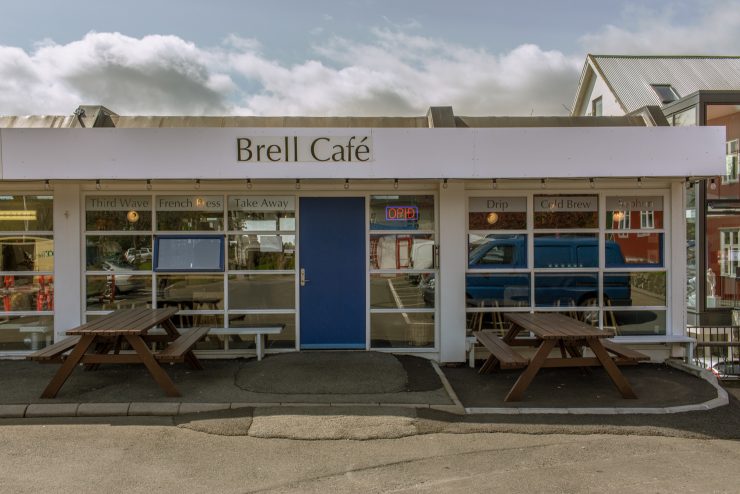
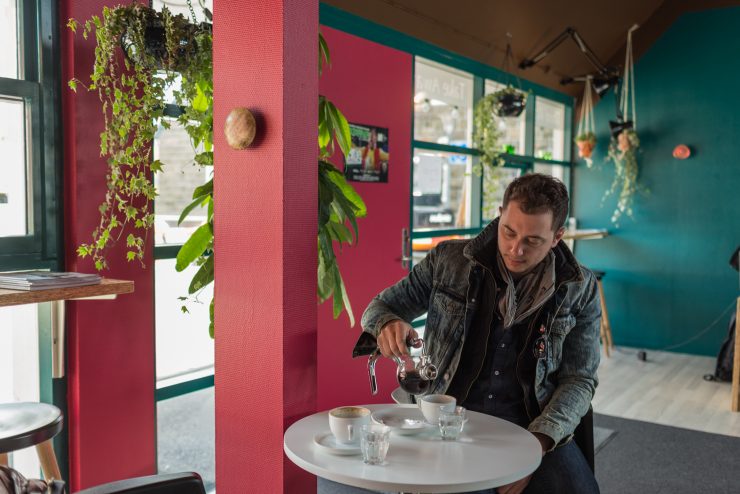
Steps away from the quaint House of Parliament—a building styled in traditional, unassuming Faroese architecture—Brell Café sits at the edge of a plateaued hill. The front faces busy squares and streets with plenty of foot traffic. The back is directed toward the city, with the ocean and rolling highlands in the near distance. The right motif was important to create an inviting and cozy atmosphere. A combination of Danish, Nordic, and Faroese design is used, with plenty of color. When approaching from the doors, you are greeted by talented baristas and immaculate coffee equipment. But it’s just behind the counter where you’re struck by a small and beautiful view of Tørshavn’s surroundings.
The space is open and airy, with plants and large windows. Tradition in Faroe has dictated speed and a jolt of caffeine as the primary factors for drinking coffee. Solutions and paths from that mentality to one rooted in quality had to be created. So, while Brell indulges in Nuova Simonelli-fueled espresso drinks and syphons, he also lines up their French presses, ready to go as customers come in for black, filter-style coffees. A small detail, but proof that Jákupsson is focused on the convenience of his patrons as he says, “I personally hate queues, so I strive to eliminate them in my cafe.”
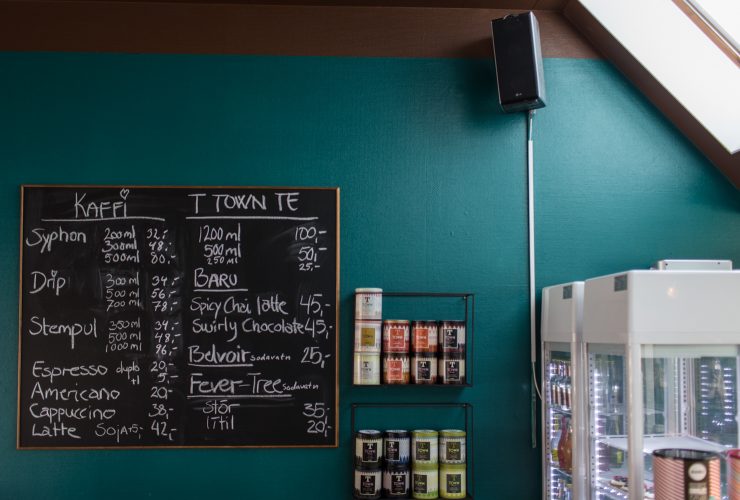
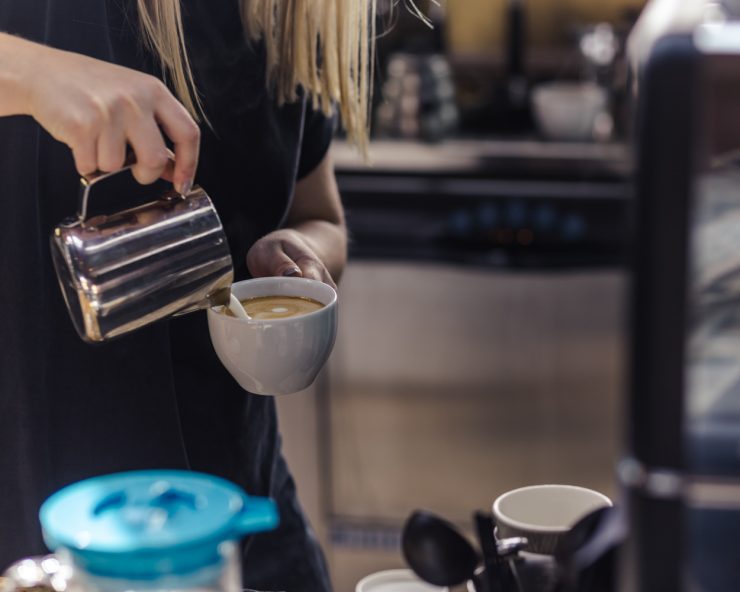
This focus stretches into the shop’s talent. For baristas and managers, Brell looked to those who had returned from Copenhagen; folks who’d worked in fast-paced cafes, such as Starbucks or Baresso, and knew the trends of craft shops. Under Jákupsson’s guidance, the baristas then begin to educate inquisitive customers about coffee, utilizing analogies of fresh bread and fruit. Jákupsson describes the response: “People are fascinated by the beauty of the syphon and thrilled about the thoroughness and care we take of the drip.” It’s a strategy that has broken down barriers in Faroe and paid off.
Talented baristas, a multitude of quality, fresh roasts alongside top-notch equipment has the cafe—and the islands—poised well for the future. Jákupsson’s humbleness shone through as he discussed it, “People know the brand Brell well enough today to trust the quality, so I might keep a solid position, even if competitors might show up in the long run.” His roasts and his cafe have made an impressionable mark on these small isles in the North Atlantic.
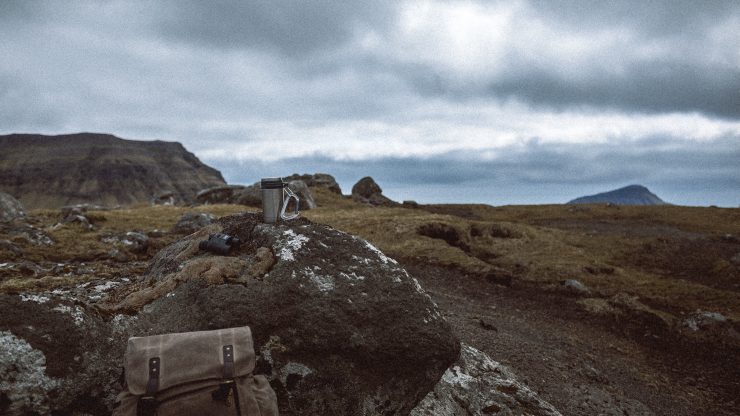
On our last day, a friend we’d met on the plane took us on a gorgeous, informative walking tour of the city. We stopped by the coffeehouse one more time. Discussions about coffee were happening at the bar, the queue moved fast, the couches were occupied, and our coffee was delectably light with notes of blackberry abounding. Great coffee had truly arrived in the Faroe Islands.
Brell Café is located at Vaglið 13, FO100 Tørshavn, Faroe Islands. Follow them on Facebook.
Adam Arcus (@aarcusphoto) is a journalist and photographer based in Chicago. Read more Adam Arcus on Sprudge.
The post Coffee On The Faroe Islands At Brell Café appeared first on Sprudge.

